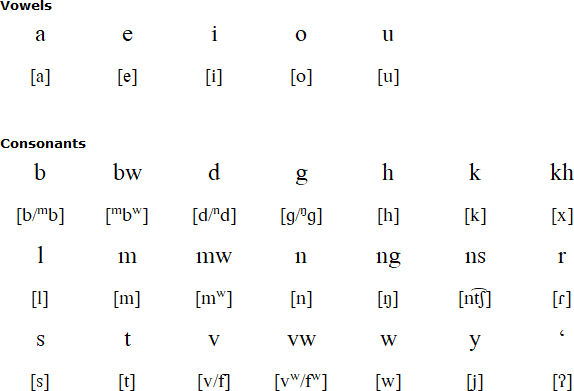Neve‘ei is a member of the Southern Oceanic branch of the Malayo-Polynesian language family. It is spoken by about 750 people mainly in the village of Vinmavis on the west coast of Malakula Island in Malampa province of Vanuatu. There are also speakers of Neve‘ei in nearby hamlets and villages such as ‘Aran, Lowisal, Lingarakh and Khatbol, and in Port Vila on Efate Island, and in Luganville on Espiritu Santo Island.
Neve‘ei is also known as Vinmavis, Lambumbu or Mallicolo. Older native speakers call it Neve‘ei, while younger native speakers call it Nabusian teget (our language). It is known as Lanwis Vinmavis (the language of Vinmavis) in Bislama.
There is no standard orthography for Neve‘ei. It is rarely written, but is sometimes used to write songs, family histories and other material. Writers tend to use their own spelling systems. The orthography below is used in Jill Musgrave's A grammar of Neve‘ei, Vanuatu

Download an alphabet chart for Neve‘ei (Excel)
Natuturmwitiyilian nen nebwe-vwer-vwer sur mweran nenal itie i-vwer-vwer sur nurukhum bitiven nabulmens. Utnen medang ar ar-vwer abwera-tubu minminnnabulmens i be-mera‘ ra‘ai yang nurukhum i ba-khar-khara‘ len netan utnen abwer-leh nei mang i-rogulel ba-ruv bwe-nsaren khava-n.
The story, which I will tell this midday, tells of a crab and a kingfisher... when they planned to race ... like ... the kingfisher would fly above and the crab would crawl on the ground when they would see whoever could run faster than his friend.
Source: A grammar of Neve‘ei, Vanuatu, by Jill Musgrave
Information about Neve‘ei | Numbers
Information about Neve‘ei
https://en.wikipedia.org/wiki/Neve‘ei_language
https://www.ethnologue.com/language/vnm/
http://www.language-archives.org/language/vnm
https://openresearch-repository.anu.edu.au/
https://endangeredlanguages.com/lang/3371
Adzera, Ahamb, Äiwoo, Aneityum, Apma, Araki, Are, ʼAuhelawa, Avava, Babatana, Bariai, Bola, Big Numbas, Buhutu, Bwaidoka, Caac, Cheke Holo, Daakaka, Dorig, Hiri Motu, Hiw, Hoava, Kakabai, Kaninuwa, Kokota, Koro. Kove, Kurti, Kwamera, Lakon, Lehali, Lenakel, Lewo, Lote, Lo-Toga, Löyöp, Manam, Marovo, Maskelynes, Mato, Mavea, Mono-Alu, Mota, Motu, Mussau-Emira, Mwerlap, Mwotlap, Nafsan, Nahavaq, Namakura, Naman, Nanggu, Nduke, Neve‘ei, Neverver, Ninde, North Efate, Nume, Paamese, Papapana, Raga, Rotuman, Roviana, Sa, Sakao, Saliba, Siar, Sio, Ske, Sobei, Sursurunga, Tamambo, Tami, Teanu, Tigak, Tirax, Tolai, Touo, Ubir, Ughele, Uneapa, Vatlongos, Vitu, Vurës, Western Fijian, Yabem, Yapese
Languages written with the Latin alphabet
Page created: 12.04.23. Last modified: 26.09.23
[top]
You can support this site by Buying Me A Coffee, and if you like what you see on this page, you can use the buttons below to share it with people you know.

If you like this site and find it useful, you can support it by making a donation via PayPal or Patreon, or by contributing in other ways. Omniglot is how I make my living.
Note: all links on this site to Amazon.com, Amazon.co.uk
and Amazon.fr
are affiliate links. This means I earn a commission if you click on any of them and buy something. So by clicking on these links you can help to support this site.
[top]